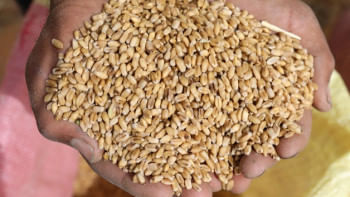Wheat export ban: Rain might rot 1.7m tonnes at Indian ports

India has allowed wheat shipments of 469,202 tonnes since banning most exports last month, but at least 1.7 million tonnes is lying at ports and could be damaged by looming monsoon rains, government and industry officials told Reuters.
Shipments that have been allowed moved mainly to Bangladesh, the Philippines, Tanzania and Malaysia, said a senior government official, who also stated the total quantity.
The ban pulled Indian wheat exports down to 1.13 million tonnes in May from a record 1.46 million tonnes in April, the official said, declining to be named.
India, the world's second-biggest wheat producer, imposed a general ban on exports on May 14 as a scorching heat wave curtailed output and pushed domestic prices to record highs.
Exceptions were allowed for shipments backed by letters of credit that had already been issued and those to countries that requested supplies to meet their food security needs.
But even after the departure of some wheat, at least 1.7 million tonnes remained piled up at various ports, three dealers with global trading firms told Reuters.
Before the ban, exporters moved unusually large quantities to ports, because the crop was then expected to be strong and the government was encouraging them to replace Black Sea supply lost because of the war in Ukraine.
They expected New Delhi to authorise shipments this year of 8 million to 10 million tonnes or even more, compared with 7.2 million tonnes last year.
"Kandla and Mundra ports have maximum wheat stocks," said a Mumbai-based dealer with a global trading firm. "Together they are holding more than 1.3 million tonnes."
The government needed to issue export permits promptly, because wheat at the ports was in loose form and therefore vulnerable to monsoon rains, said a New Delhi based dealer with a global trading firm.
India receives heavy rainfall during the monsoon season, from June to September.
"The government banned wheat exports to ensure food security, but if stocks get damaged by rains, then it will not serve any purpose," the dealer said.
Moving the wheat back out of ports and into interior towns for local consumption was unfeasible, as traders would incur additional losses on loading and transportation fees, said the Mumbai-based dealer.
"The government should allow exports of wheat lying at ports for government-to-government deals," he said.
India has received requests to supply more than 1.5 million tonnes of wheat from several countries facing shortages.

 For all latest news, follow The Daily Star's Google News channel.
For all latest news, follow The Daily Star's Google News channel. 









Comments